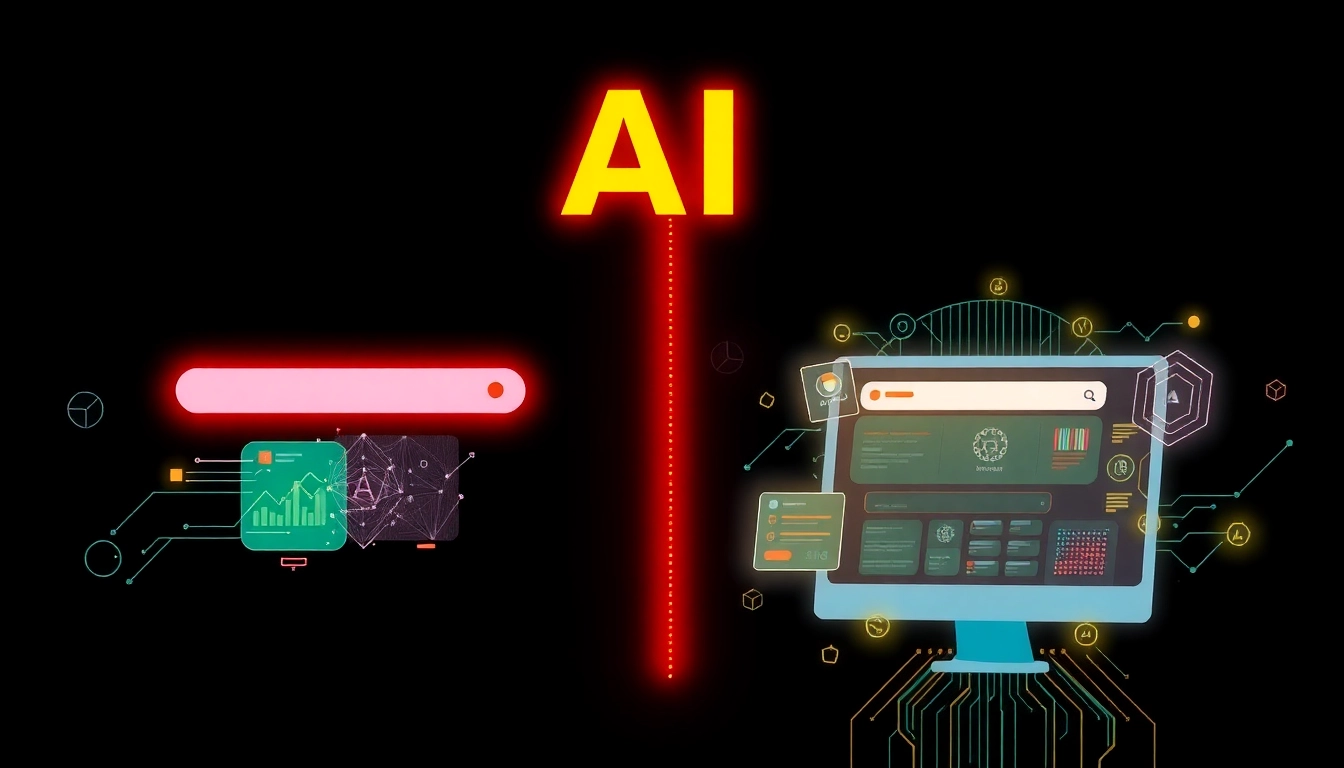Introduction to AI Search Engines
In an era dominated by the vast expanse of information available online, traditional search engines are evolving into something much more sophisticated: AI search engines. These innovative platforms leverage artificial intelligence capabilities to enhance the efficiency and relevance of search results. This transformation is not merely about speed, but also about the quality of the information being retrieved. An AI search engine employs advanced algorithms and machine learning techniques to understand user intentions and provide contextually rich search experiences. Whether for personal, professional, or academic use, understanding the dynamics of AI search engines is essential to navigate the digital landscape effectively.
Defining AI Search Engines
AI search engines utilize artificial intelligence to interpret and respond to user queries in a more conversational and contextualized manner than traditional search engines. Unlike conventional engines that primarily rely on keyword matching, AI search engines employ natural language processing (NLP) and machine learning to comprehend the nuances of human language. This includes grasping synonyms, user sentiment, and even the intent behind queries. As a result, these platforms provide users with more relevant and accurate results, often summarizing content and offering direct answers to questions rather than simply listing links.
How AI Transforms Search Efficiency
The transformation brought about by AI in search engines is multifaceted. One significant improvement is the ability to process vast amounts of data in real-time, which allows these engines to deliver answers swiftly and efficiently. With machine learning, these platforms learn from users’ behaviors, optimizing results based on previous interactions. Additionally, AI enhances personalization; search engines can tailor content suggestions and results according to individual user preferences and behavior patterns. These features mean that users spend less time sifting through irrelevant information and more time accessing what truly matters to them.
Comparing AI Search Engines with Traditional Search
While traditional search engines like Google or Bing primarily return pages of links based on keyword relevance, AI search engines distinguish themselves by focusing on the user’s intention behind a query. The latter can synthesize knowledge from multiple resources and present information in a user-friendly manner. For instance, AI systems like ChatGPT can generate human-like text responses, answer complex inquiries, and maintain conversational exchanges, making them particularly useful for interactive searches. In comparison, users might find interacting with traditional search engines less intuitive, often leading to extended searches for comprehensive answers.
Top AI Search Engines in 2025
Overview of Leading Platforms
As the landscape of AI search engines continues to evolve, several platforms are establishing dominance in this space. Notable contenders include Google’s Gemini, Microsoft’s Copilot, and Perplexity AI. Each offers unique features and capabilities designed to meet user demands in various contexts. Understanding the different offerings is critical for users to select the best tool for their needs.
Unique Features of Each AI Search Engine
1. Google Gemini: Google’s latest AI offering emphasizes context and conversational understanding. It integrates with existing Google services, allowing users to search across media types and even generate content based on queries. This platform adapts to user preferences over time, enhancing relevance and comprehension.
2. Microsoft Copilot: Built into Microsoft Office tools, Copilot seamlessly integrates AI search capabilities directly within applications. Users can pull information from the web while composing documents, increasing productivity while ensuring access to up-to-date information.
3. Perplexity AI: This engine excels in combining generative AI with traditional web search to clarify complex inquiries. By synthesizing multiple sources, it provides comprehensive answers while maintaining citations and supporting materials for further exploration.
Each of these platforms is designed not only to enhance straightforward searches but to reshape how users interact with digital content altogether.
User Reviews and Experience Insights
User feedback and reviews play a vital role in understanding the effectiveness of AI search engines. Data indicates that many users appreciate the conversational tone and contextual accuracy provided by AI engines, particularly when dealing with intricate or nuanced queries. For instance, Perplexity AI has received praise for its ability to present well-structured answers that cite sources, which significantly boosts user trust and engagement. Microsoft Copilot has been lauded for its integration into everyday workflows, streamlining tasks and reducing the need to switch between multiple platforms. Such insights are invaluable for prospective users considering which AI search engine to adopt for their personal or professional use.
Implementing AI Search Engines for Personal Use
Getting Started: Setup and Installation
Getting started with an AI search engine involves straightforward steps, often beginning with creating an account on the chosen platform. Most AI search engines include user-friendly interfaces that guide new users through the setup process. For instance, Google’s Gemini allows users to log in using their existing Google credentials, while platforms like Perplexity AI and Copilot may require email verification before gaining access. Once set up, users can customize their preferences in settings, such as content preferences and personalization options.
Optimizing Search Queries for Better Results
To maximize the potential of AI search engines, users should optimize their search queries. This can be achieved by employing natural language techniques—phrasing questions as full sentences instead of keywords helps the AI understand intent more effectively. Furthermore, users should utilize specific terms related to their inquiries; for example, instead of searching “weather,” trying “What is the weather today in New York?” will yield more accurate results. Testing various inquiries and analyzing responses will refine users’ abilities to interact with the platform effectively.
Best Practices for Using AI Search Engines Effectively
Best practices for employing AI search engines include:
- Experiment with Input Styles: Adjust phrasing to see how AI interprets requests. Use questions, commands, and conversational tones.
- Utilize Follow-up Questions: Engage in dialogue with the AI, encouraging deeper exploration of topics or clarification of answers.
- Store Useful Information: Take advantage of features that allow saving or bookmarking crucial information for future reference.
- Stay Informed: Keep up with updates and feature releases as AI search engines frequently evolve, introducing new functionalities.
Employing these practices not only enhances user experience but also empowers individuals to better utilize the technology at their disposal.
Challenges and Limitations of AI Search Engines
Addressing Common User Concerns
Despite their many advantages, AI search engines are not without challenges. A principal concern relates to misinformation—users may worry about the accuracy of the responses generated by AI, especially when dealing with sensitive or complex topics. It’s essential for users to critically assess the information provided and verify it against reliable sources. Furthermore, users should be aware that AI algorithms might lack comprehensive understanding, occasionally leading to incomplete or biased responses.
Mitigating Data Privacy Risks
Data privacy is an ever-growing concern within the realm of digital searches. AI search engines typically require access to user data to enhance personalization and improve search results. To mitigate privacy risks, users should review the privacy policies of their chosen platform, ensuring a clear understanding of how their data is used. Utilizing features such as incognito modes or anonymized accounts can help protect personal information while still benefiting from AI capabilities.
Understanding Algorithm Biases in AI
Algorithmic bias presents another challenge in the context of AI search engines. As these engines learn from data sources, any inherent biases in those sources can be reflected in the AI’s outputs. Users should remain vigilant and critical of the information provided. Efforts to enhance transparency in AI systems are crucial for addressing these concerns. Engaging with resources that explain how AI develops and evolves can empower users to make more informed decisions when using these tools.
The Future of AI in Search Technology
Trends Shaping AI Search Engines
The future of AI in search technology is bright, with several key trends emerging. One major trend is the increased incorporation of multimodal capabilities, allowing users to interact through voice, text, and images seamlessly. Advanced machine learning models will continue to evolve, further enhancing contextual understanding and delivering personalized experiences at an unprecedented level. Also, as societal attitudes toward AI integrate into technology’s landscape, ethical considerations will necessitate transparency and fairness from AI developers.
Integration with Other Technologies
AI search engines are also set to integrate with a variety of emerging technologies. The combination of AI with augmented reality (AR) and virtual reality (VR) is anticipated to revolutionize the search experience, allowing users to explore environments and information dynamically. For instance, imagine searching for information about historical sites in a specific area, allowing the AI to construct an interactive AR experience where users can visualize the sites in real-time.
Predictions for AI Search Engines in 2030
Looking ahead to 2030, we can expect AI search engines to become deeply ingrained in everyday technology. Predictive and anticipatory search functionalities may allow AI to provide relevant results even before users formulate their queries based on learned patterns and behaviors. Moreover, increased collaboration between AI and human experts in refining search processes will help bridge gaps in understanding complex subjects, making information retrieval not only efficient but also comprehensive. The progressive adaptation of AI search engines over the coming years will significantly shape how we interact with information and technology.


